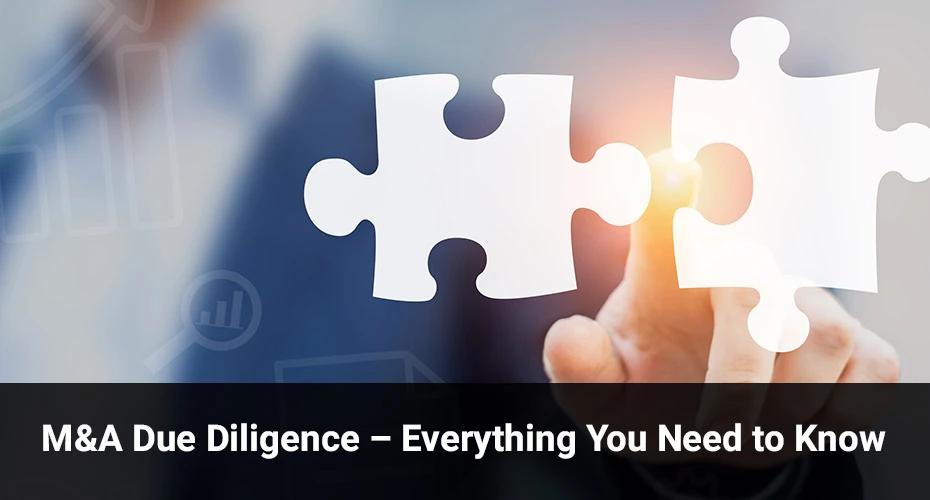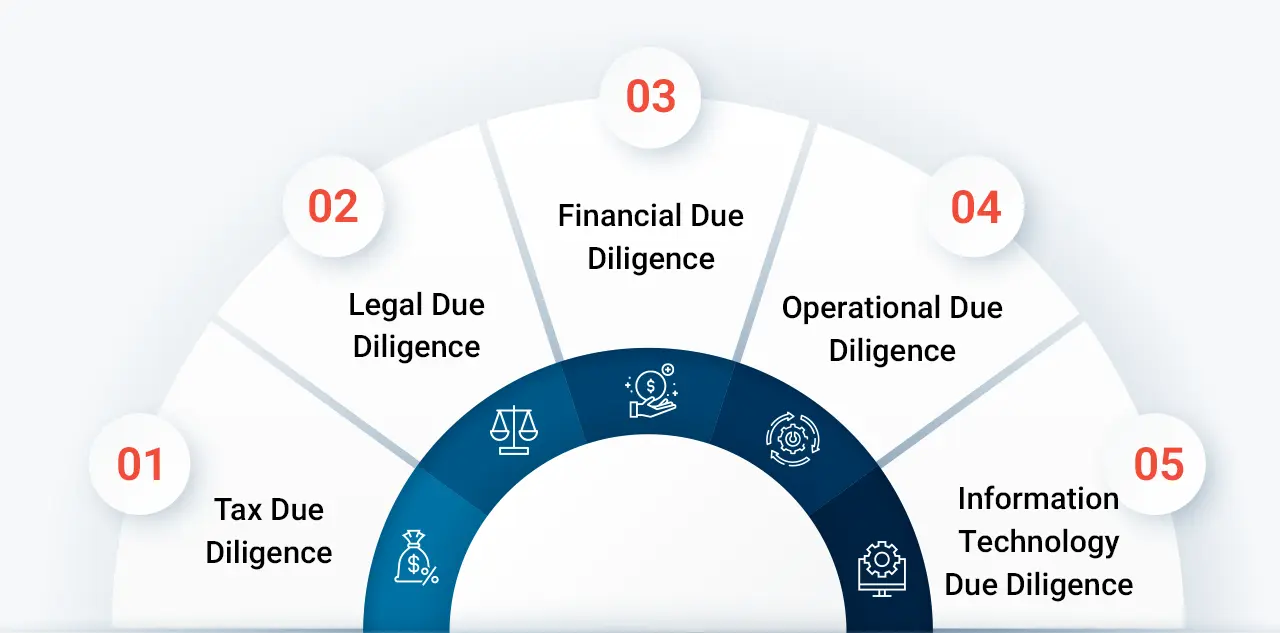Mergers and Acquisitions (M&A) take place for multiple strategic business reasons, including but not limited to diversifying products or services, gaining a competitive advantage in the market, increasing capabilities, and cutting costs. However, not all M&As lead to the successful fulfillment of the set-out business objectives.

Some M&As fail due to a change in a scenario – that isn’t completely in control of either the buyer or the seller. However, several M&A deals are set out for doom from the outset. By identifying and eliminating reasons for failures at the very beginning, organizations can increase the chances of an M&A succeeding. This is where the expertise of M&A Consulting Services comes into play, guiding businesses in navigating the complexities and mitigating risks throughout the M&A process.
What Is the M&A Due Diligence Process?
During a merger or acquisition and before any transactions are made, an in-depth review and audit of a business must be made. The primary goal of the m&a due diligence process is to ensure that companies are making the best decisions to maximize the chances of adding more value in an M&A transaction.
5 Types of M&A Due Diligence
When it comes to mergers and acquisitions, there are generally five primary types of due diligence:

1. Tax Due Diligence
Tax due diligence examines the company’s tax affairs and ensures that all tax liabilities have been paid in full to date. Tax due diligence takes into account how a merger will impact the tax liabilities of the new entity formed by the transaction.
2. Legal Due Diligence
Legal due diligence examines all legal aspects of the business and its contractual ties with its stakeholders. Licenses, regulatory issues, contracts, and any pending legal liabilities are typical areas of the due diligence process.
3. Financial Due Diligence
Financial due diligence examines the company’s financial performance up to the present day and ensures that the numbers presented in the financial statements are accurate and sustainable.
4. Operational Due Diligence
Operational due diligence examines the company’s operations, specifically how it converts inputs into outputs. This is generally regarded as the most forward-thinking type of due diligence.
5. Information Technology Due Diligence
Information technology due diligence examines a company’s IT infrastructure and operations, typically with a focus on security assessment. Due diligence of this type helps the purchasing company evaluate present IT structures and recognize potential security threats.
How Long Does M&A Due Diligence Take?
The time it takes to complete the M&A due diligence process varies because there are a number of variables to consider. How complex is the business? Does the seller have dedicated resources to complete the task? How motivated is the seller to compile this information in a short amount of time? Smaller mergers and acquisitions may take a few weeks to a few months and larger mergers and acquisitions may take an average of two to three months or more.
Why Is the Due Diligence Process Important?
The key reasons why many M&As fail are that both parties don’t complete the due diligence process before laying out their M&A strategy. The due diligence process helps stakeholders understand the synergies and potential scalability of the businesses after the merger/acquisition.
During the process, all internal and external factors that create risk in the acquisition are identified and focus is driven towards key factors that drive profitability. Employees, processes, and patents must be carefully analyzed to draw a clearer picture of the actual business scenario. Assessing risks and opportunities through scenario planning can give richer insights than what the balance sheets will ever show.
Common M&A Due Diligence Challenges
Obtaining a thorough understanding of a company can be a specialized process that goes beyond the expertise of most individuals without field experience.
There are numerous challenges that can arise, but the following are typically encountered:
- Not knowing what questions need to be asked: A due diligence checklist is critical during a merger or acquisition, so you know how to investigate potential risks.
- Slow execution: Documentation can take time and this can delay the transaction.
- Lack of effective communication: During a merger or acquisition, a lack of effective communication can lead to impatience and friction.
- Insufficient expertise: Due diligence isn’t an easy task and sometimes hiring experts is the best route.
- Cost challenges: Due diligence can be expensive and time-consuming, steering sellers and buyers into cutting corners. It’s always best to seek a professional to ensure both sides are content with the deal.
Who Needs to Complete the Due Diligence Process?
It is usually the buyer and their external advisors that carry out the due diligence process. External advisors could be industry experts who can study the company’s existing business model and assess future opportunities, the audit and tax experts as well as legal professionals.
It is always a wise idea to hire external/third-party professionals early in the M&A process as it provides a buffer between the buyer and seller to help sort out potential areas of conflict. The external advisors can make both the buyer and the seller aware of the reasoning behind the other party’s point-of-view in case of a conflict.
What are the Key Steps to be Followed for Effective M&A Due Diligence?
When engaging in an M&A, it is important for the buyer to gain a robust understanding of the business model of the seller; learn how the seller conducts business, work with its employees, vendors, and services providers.
A proven due-diligence process before an M&A includes 7 key steps.
1. Evaluating the Financial Matters
This step includes evaluation of the seller’s historical financial statements, related financial metrics as well as the future projections along with the review of all material contracts and commitments of the seller, seller’s key insurance policies and income tax status (if applicable).
2. Evaluating the Technology – Along with Data Safety and Intellectual Property Stance
This step includes evaluation of the extent and quality of the seller’s existing technology stack, analysis of its performance, and the future plans for new technology stack procurement. Along with it, two other critical pieces, the evaluation of seller’s intellectual property and its processes around cybersecurity and data privacy, need to be looked at in conjunction to understand the end-to-end picture of the seller’s practices around technology management.
3. Understanding the Target Company’s Customer Base
This step includes not only a deeper evaluation of who the existing and potential customers are but also an understating of the penetration in each target base and evaluation of the sales processes.
4. Analyzing the Cultural and Strategic Fit
M&A is certainly more than merging only the fin-tech assets, it’s also about bringing people together to collaborate. Therefore, an analysis of the existing people policies, the talent of employees. and other related human-resource matters become a critical part of the M&A due diligence process.
5. Reviewing the Existing, Pending, and Settled Litigations
An overview of any litigation involving the seller is a critical piece to analyze. This may also include matters in arbitration or mediation.
6. Assessing the Compliance Standing
This step includes evaluation of seller’s adherence to regulatory compliance requirements, citations and notices received from government agencies since the company’s inception, and exemption from permit or license requirement if any.
7. Understanding the General Corporate Matters
Last but not least, a detailed review of the general corporate documentation – from information related to its subsidiaries to MoMs of the board meetings, everything must be looked into.
The Key to Due Diligence Success Is Discipline
Thorough completion of the M&A due diligence process enhances the quality of information available to the decision-makers and helps them ask the right questions and take the right step during the M&A process. Going through the due diligence activities honestly and with an open mind will not only help the entire process move smoothly and quickly but also serve the best interests of all parties involved in the transaction.
Synoptek offers M&A Consulting services. Contact an expert today.






